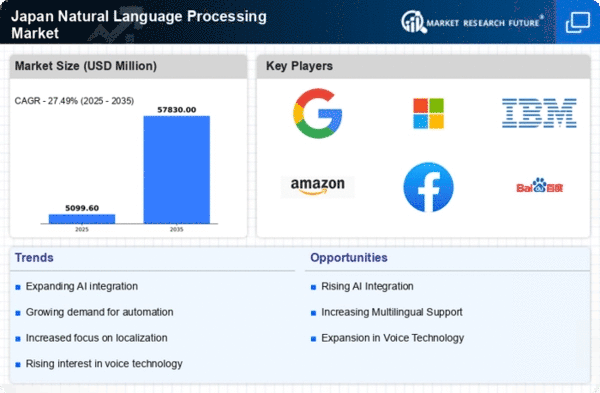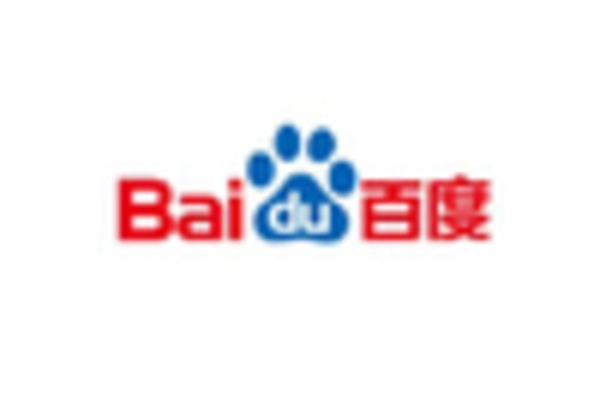Advancements in Machine Learning Algorithms
Advancements in machine learning algorithms are playing a crucial role in shaping the natural language-processing market in Japan. The continuous evolution of these algorithms enhances the capabilities of NLP systems, allowing for more accurate language understanding and generation. As of 2025, the market is expected to witness a significant increase in the adoption of deep learning techniques, which are known for their ability to process vast amounts of data and improve predictive accuracy. This trend is likely to attract investments from both startups and established companies looking to innovate within the natural language-processing market. The integration of sophisticated machine learning models is anticipated to lead to more effective applications in various sectors, including finance, healthcare, and education.
Increased Focus on Localized Language Solutions
The natural language-processing market in Japan is seeing an increased focus on localized language solutions. As businesses expand their reach within the country, the demand for NLP technologies that cater to regional dialects and cultural nuances is growing. This trend is particularly relevant in industries such as tourism and entertainment, where effective communication is essential for customer satisfaction. By 2025, it is projected that localized NLP solutions will account for a significant share of the market, as companies strive to connect with diverse consumer bases. The natural language-processing market is thus adapting to these needs, fostering the development of technologies that can accurately interpret and generate language in a culturally relevant manner.
Growth of E-commerce and Online Content Creation
The rapid growth of e-commerce and online content creation in Japan is significantly impacting the natural language-processing market. As more businesses transition to digital platforms, the need for effective content generation and management has become paramount. NLP technologies are being utilized to analyze consumer behavior, optimize product descriptions, and enhance search engine visibility. By 2025, the e-commerce sector is projected to reach a valuation of over ¥20 trillion, further driving the demand for NLP solutions that can facilitate better communication and understanding of consumer preferences. The natural language-processing market is thus poised to capitalize on this trend, as companies seek to harness the power of language technologies to improve their online presence and customer engagement.
Integration of NLP in Customer Service Solutions
The integration of natural language-processing technologies into customer service solutions is becoming increasingly prevalent in Japan. Businesses are adopting chatbots and virtual assistants powered by NLP to enhance customer engagement and provide 24/7 support. This shift is indicative of a broader trend towards improving customer experience through technology. In 2025, it is estimated that the market for NLP-driven customer service solutions will account for over 30% of the total natural language-processing market revenue in Japan. Companies are recognizing that effective communication with customers can lead to higher satisfaction rates and loyalty. The natural language-processing market is thus witnessing a transformation as organizations invest in these technologies to meet the evolving expectations of consumers.
Rising Demand for Automation in Business Processes
The natural language-processing market in Japan is experiencing a notable surge in demand for automation across various business processes. Companies are increasingly recognizing the potential of NLP technologies to streamline operations, enhance customer interactions, and improve overall efficiency. As of 2025, the market is projected to grow at a CAGR of approximately 25%, driven by the need for businesses to reduce operational costs and improve service delivery. This trend is particularly evident in sectors such as finance, healthcare, and retail, where automation can lead to significant time savings and cost reductions. The natural language-processing market is thus positioned to benefit from this growing inclination towards automation, as organizations seek to leverage advanced technologies to remain competitive in a rapidly evolving landscape.
















